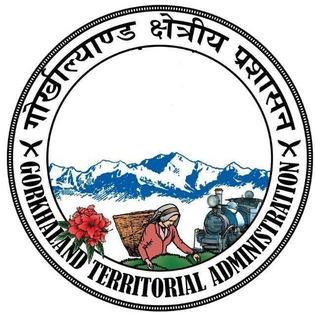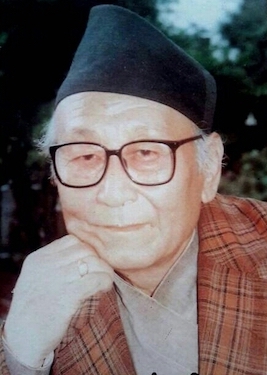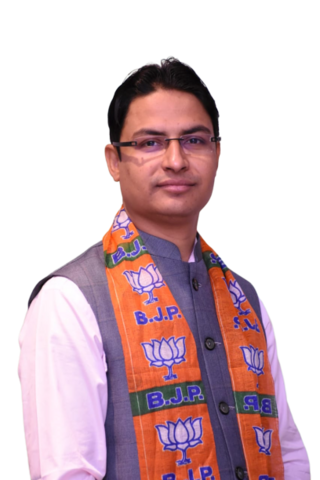Related Research Articles

India is a federal union comprising 28 states and 8 union territories, with a total of 36 entities. The states and union territories are further subdivided into districts and smaller administrative divisions.
The Comptroller and Auditor General of India is the supreme audit institution of India, established under Article 148 of the Constitution of India. They are empowered to audit all receipts and expenditure of the Government of India and the State Governments, including those of autonomous bodies and corporations substantially financed by the Government. The CAG is also the statutory auditor of Government-owned corporations and conducts supplementary audit of government companies in which the Government has an equity share of at least 51 percent or subsidiary companies of existing government companies. The reports of the CAG are laid before the Parliament/Legislatures and are being taken up for discussion by the Public Accounts Committees (PACs) and Committees on Public Undertakings (COPUs), which are special committees in the Parliament of India and the state legislatures. The CAG is also the head of the Indian Audit and Accounts Department, the affairs of which are managed by officers of Indian Audit and Accounts Service, and has 43,576 employees across the country.

Kurseong is a town and a municipality in Darjeeling district in the Indian state of West Bengal. It is the headquarters of the Kurseong subdivision.

The Gorkhaland movement is a campaign to create a separate state of India in the Gorkhaland region of West Bengal for the Nepali speaking Indians. The proposed state includes the hill regions of the Darjeeling district, Kalimpong district and Dooars regions that include Jalpaiguri, Alipurduar and parts of Cooch behar districts. A demand for a separate administrative unit in Darjeeling has existed since 1909, when the Hillmen's Association of Darjeeling submitted a memorandum to Minto-Morley Reforms demanding a separate administrative setup.
Darjeeling Gorkha Hill Council (DGHC) (1988–2012), also once known for a short period of time as Darjeeling Gorkha Autonomous Hill Council was a semi-autonomous body that looked after the administration of the hills of Darjeeling District in the state of West Bengal, India. DGHC had three subdivisions under its authority: Darjeeling, Kalimpong, and Kurseong and some areas of Siliguri subdivision.
The Gorkha Janmukti Morcha (GJM) is a registered unrecognized political party, that campaigns for the creation of a separate state Gorkhaland within India, out of districts in the north of West Bengal. The party was launched on 7 October 2007. The faction led by Binay Tamang, which was created out of Gorkha Janmukti Morcha in 2017, merged into Gurung's GJM in 2021 after Tamang's resignation, following which he joined Trinamool Congress.

Vinod Rai is a former IAS officer who served as the 11th Comptroller and Auditor General of India. He assumed office on 7 January 2008 till 22 May 2013. He is the current chairman of UN Panel of External Auditors and Honorary Advisor to the Indian Railways and a member of the Railway Kaya Kalp Council.
R. V. S. Peri Sastri, was a former Chief Election Commissioner of India and served from 1 January 1986 until his death from cancer on 25 November 1990. The 1989 general elections were held during his tenure.

Indian Gorkhas also known as Nepali Indians, are Nepali language-speaking Indians. The modern term "Indian Gorkha" is used to differentiate the ethnic Gorkhas from Nepalis.

The Gorkhaland Territorial Administration is a semi-autonomous council for the Darjeeling and Kalimpong districts of West Bengal state in India. The GTA was formed in 2012 to replace the Darjeeling Gorkha Hill Council, which was formed in 1988 and administered the Darjeeling hills for 23 years.
The Coal allocation scam, dubbed in media as Coalgate, is a major political scandal concerning the Indian government's allocation of the nation's coal deposits to public sector enterprise (PSEs) and private companies. In a draft report issued in March 2012, the Comptroller and Auditor General of India (CAG) office accused the Government of India of allocating coal blocks in an inefficient manner during the period 2004–2009. Over the Summer of 2012, resulting in a Central Bureau of Investigation probe into whether the allocation of the coal blocks was in fact influenced by corruption.
Subash Ghisingh was an Indian politician who was the leader of Gorkha National Liberation Front (GNLF), which he founded in 1980. He was the chairman of the Darjeeling Gorkha Hill Council in West Bengal, India from 1988 to 2008. He spearheaded the Gorkhaland movement in the 1980s.

Shashi Kant Sharma is a retired central civil servant of 1976 batch under IAS cadre belonging to Bihar. He was the Comptroller and Auditor General of India. In July 2014 he assumed office as a Member of the United Nations Board of Auditors. On 11 January 2017, Sharma took over as the Chairman of the United Nations Board of Auditors. The reports of the Board serve as a key input for policy making within the UN.
Vijayendra Nath Kaul was the tenth Comptroller and Auditor General of India (CAG) from 2002 to 2008. He was awarded the Padma Bhushan in 2014.

Shiva Kumar Rai (1919-1995) was a Nepali language writer and politician from Darjeeling, India. He won the Sahitya Akademi Award in 1978 for his collection of short stories Khaharey. He was the first Gorkha minister in the state of West Bengal after becoming a deputy minister in 1952.

Rajiv Mehrishi was born on 8 August 1955 in Rajasthan. He was the 13th Comptroller and Auditor General of India (C&AG) and Vice Chairman of the United Nations Panel of External Auditors. He is a retired Indian Administrative Service (IAS) officer of the 1978 batch belonging to the Rajasthan cadre.

V. Narahari Rao was an Indian civil servant who served the Indian Audit and Accounts Service in the post-independence India. He served as the first Comptroller and Auditor General of India from 1948 to 1954. The Government of India awarded him the third highest civilian honour of the Padma Bhushan, in 1954, for his contributions to civil service.

Binay Tamang is an Indian Politician and a former leader of the Gorkha Janmukti Morcha political party. He joined All India Trinamool Congress in 2021 and Left party in 2022.

Raju Bista is an Indian politician and managing director of Surya Roshni Limited. He was elected to the Lok Sabha, lower house of the Parliament of India, from Darjeeling, West Bengal in the 2019 Indian general election as a member of the Bharatiya Janata Party. He is a National Spokesperson of the BJP. On 14 July, 2021, he has been appointed as a National General Secretary of Bharatiya Janata Yuva Morcha.
References
- 1 2 3 4 5 6 7 "Archived copy" (PDF). Archived from the original (PDF) on 3 January 2014. Retrieved 3 January 2014.
{{cite web}}: CS1 maint: archived copy as title (link) CAG of India. - 1 2 3 4 5 6 "Former CAG C G Somaiah passes away". Mangalorean.com. Mangalore Media Company. Archived from the original on 3 January 2014. Retrieved 3 January 2014.
- 1 2 3 Bhattacharya, A K (9 September 2010). "The confidential bureaucrat". Business Standard. Retrieved 3 January 2014.
- 1 2 3 4 Anand, V. Eshwar (19 September 2010). "He stood firm against pressure". The Tribune, India. Retrieved 3 January 2014.
- 1 2 3 Padmanabhan, A. S. (24 August 2010). "A lucky loner in the corridors of power". The Hindu. Retrieved 3 January 2014.
- 1 2 3 4 Gopalakrishnan, R (9 August 2010). "On The Half-Tones of Truth". Outlook India. Archived from the original on 3 January 2014. Retrieved 3 January 2014.
- ↑ Dasgupta, Surajit Kumar (1992). West Bengal's Jyoti Basu: A Political Profile. New Delhi: Gyan Books. p. 75. ISBN 9788121204200.
- ↑ "C.G. Somaiah's Book to be launched". COFFEELAND. Coorg.com. Retrieved 3 January 2014.
- ↑ "The honest always stand alone". Flipkart. Flipkart. Retrieved 3 January 2014.
- ↑ "The honest always stand alone". Goodreads. Goodreads. Retrieved 3 January 2014.
- 1 2 Kumar M (TNN), Anil (14 September 2010). "Former CAG dead". The Times of India, Bangalore. Retrieved 3 January 2014.